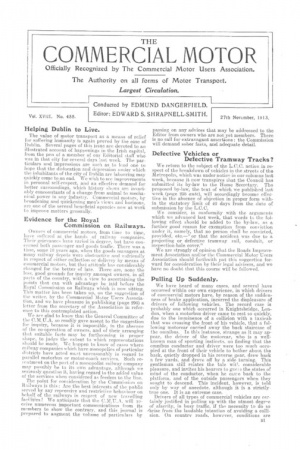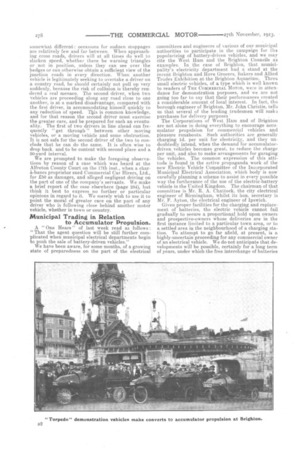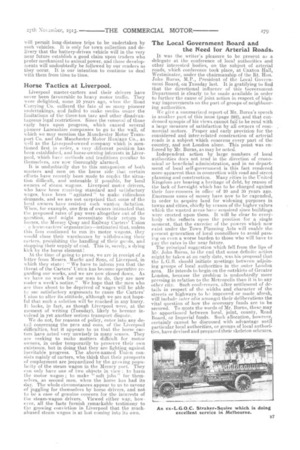COMMERCIAL MOTOR
Page 1

Page 2

Page 3

If you've noticed an error in this article please click here to report it so we can fix it.
Officially Recognized by The Commercial Motor Users Association.
The Authority on all forms of Motor Transport. Largest Circulation.
Conducted by EDMUND DANGERFIELD.1 Editor: EDWARD S. SHRAPNELL-SMITH.
Helping Dublin to Live.
The value of motor transport as a means of relief for suffering humanity is again proved by the case of Dublin. Several pages of this issue are devoted to an illustrated account of happenings in the Irish capital, from the pen of a member of our Editorial staff who was in that city for several days !ast week. The particulars and impressions are such as to lead one to hope that the dislocation and depression under which the inhabitants of the city of Dublin are labouring may quickly come to an end. We wish to see improvements in personal self-respect, and an effective demand for better surroundings, which history shows are invariably concomitants of a change from animal to niechardeal power in any industry. Commercial motors, by broadening and quickening men's views and horizons, are one of the several beneficial agencies now at work to improve matters generally.
Evidence for the Royal Commission on Railways.
Owners of commercial motors, from time to time, have suffered at the hands of railway companies. Their grievances have varied in degree, but. have con-, corned both, passauger and goods traffic. There was a time, some 10 years ago, when the goods managers at many railway depots were obstructive and unfriendly in respect of either collection or delivery by means of commercial motors, but that attitude has considerably changed for the better of late, There are, none the less, good grounds for inquiry amongst owners, in all parts of the country, with a view to ascertaining the points that can with advantage be laid before the Royal Commission on Railways which is now sitting. This matter has been taken up, on the suggestion of the writer, by the Commercial Motor rsers Association, and we have pleasure in publishing (pa:ge 296) a letter from the secretary of the Association in reference to this contemplated action.
We are glad to know that the General Committee of the C.M.U,A. so readily gave assent to the suggestion for inquiry, because it is impossible, in the absence of the co-operation of owners, and of their arranging that suitable facts may be forthcoming in proper shape, to judge the extent to which representations should be made. We happen to know of cases where railway companies which have monopolies of particular districts have acted most unreasonably in regard to parallel motorbus or motor-coach services. Such resentment on the part of a monopolist railway company may possibly be to its own advantage., although we seriously question it, having regard to the added value of the services when considered as feeders to the line.
The point for consideration by the Commission on Railways is this : Are the best interests of the public served by any repressive and restrictive behaviour on behalf of the railways in respect of new travelling facilities? We anticipate that the C.:W.T7. A. will receive numerous important communications from its members to show the contrary, and this journal is. prepared to augment the volume of particulars by passing on any advices that may be addressed to the Editor front owners who are not yet members. There is no call for extravagant assertions : the Commission will demand sober facts, and adequate detail,
Defective Vehicles or Defective Tramway Tracks?
We return to the subject of the L.C.C. action in respect of the breakdown of vehicles in the streets of the Metropolis, which was under notice in our columns last week, because it now transpires that the Council has submitted its by-law to the Home Secretary. The proposed by-law, the text of which we published last week (page 258 ante), will accordingly become effective in the absence of objection in proper form within the statutory limit of 40 days from the date of submission by the L.C.C.
We consider, in conformity with the arguments which we advanced last week, that words to the following effect should be added to the by-law, as a further good reason for exemption from conviction under it, namely, that no person shall be convicted, provided, etc.—" or that the accident was due to a projecting or defective tramway rail, conduit, or inspection-hole cover." We are strongly of opinion that the Roads Improvement Association and/or the Commercial Motor Esera Association should forthwith put this suggestion forward for consideration by their legal advisers, and wo have no doubt that this course will be followed.
Pulling Up Suddenly.
We have heard of many cases, and several have occurred within our own experience, in which drivers of commercial motors have, by reason of the suddenness of brake application, incurred the displeasure of drivers of following vehicles. The record case is probably one which occurred in Knightsbridge, London, when a motorbus driver came to rest so quickly, due to the imminence of a collision with a taxicab that was crossing the front of his vehicle, that a following motorcar carried away the back staircase of the omnibus. In this instance, strange as it may appear, the driver of the motorcar, who is a wellknown man of sporting instincts, on finding that the omnibus conductor and driver were too much occupied at the front of their vehicle to bother about the back, quietly dropped in his reverse gear, drew back a few yards, and drove off by a side turning. This gentleman still relates the tale wit!: considerable pleasure, and invites his hearers to pie s the states of mind of the conductor, when he came back to the platform, and of the outside passengers when they sought. to descend. This incident, however, is told only by way of anecdote, although it is a strictly. true one. It is an extreme case.
Drivers of all types of commercial vehicles are certainly justified in pulling up with the utmost degree of alacrity, in busy traffic, if the necessity to do so /arise from the laudable intention of avoiding a collision. On country roads, however, conditions are 31
somewhat different : occasions for sudden stoppages are relatively few and far between. When approaching cross roads, drivers will at all times do well to slacken speed, whether there be warning triangles or not in position, unless they can see over the hedges or can otherwise obtain a sufficient view of the junction roads in every direction. When another vehicle is legitimately seeking to overtake a driver on a country road, he should certainly not pull up very suddenly, because the risk of collision is thereby rendered a. real menace. The second driver, when two vehicles are proceeding along any road close to one another is at a marked disadvantage, compared with the first' driver, in accommodating himself quickly to any reduction of speed. This is common knowledge, and for that reason the second driver must exercise the greater care, and be prepared for such an eventuality. The first of two drivers in line ahead can frequently "get through" between other moving vehicles, or a moving vehicle and some obstruction. It is not safe for the second driver of the two to conclude that he can do the same. It is often wise to drop back, and to be content with second place and a 50-yard interval.
We are prompted to make the foregoing observations by reason of a case which was heard at the Alfreton County Court on the 17th inst., when a charit-banes proprietor sued Commercial Car Hirers, Ltd., for 250 as damages, and alleged negligent driving on the part of one of the company's servants. We make a brief report of the case elsewhere (page 284), but think it best to express no further or particular opinions in regard to it. We merely wish to use it to point the moral of greater care on the part of any driver who is following close behind another motor vehicle, whether in town or country.
Municipal Trading in Relation to Accumulator Propulsion.
A "One Hears" of last week read as follows : "That the agent question will be still further complicated when municipal electrical departments begin to push the sale of battery-driven vehicles."
We have been aware, for some months, of a growing state of preparedness on the part of the electrical
committees and engineers of various of our municipal authorities to participate in the campaign for tira popularizing of battery-driven vehicles, and we may cite the West Ham and the Brighton Councils as examples. In the ease of Brighton, that municipality's electricity department had a stand at the recent Brighton and Hove Grocers, Bakers and Allied `Ludes Exhibition at the Brighton Aquarium. Threo small electric vehicles, of a type which is well known to readers of THE COMMERCIAL MOTOR, were in attendance for demonstration purposes, and we are not going too far to say that their performances created a considerable amount of local interest. In fact, tho borough engineer of Brighton, Mr. John Christie, Cello us that several of the leading tradesmen will rnak,_a purchases for delivery purposes ' The Corporations of West Iiam and of Brighton are not alone in doing everything to encourage accumulator propulsion for commercial vehicles and pleasure runabouts. Such authorities are generally charging id. per unit for electricity, and they undoubtedly intend, when the demand for accumulatordriven vehicles becomes great, to reduce the charge per unit, and also to make arrangements for garaging the vehicles. The common expression of this attitude is found in the active propaganda work of the new Electric. Vehicle Committee of the Incorporated Municipal Electrical Association, which body is now carefully planning a scheme to assist. in every possible way the furtherance of the use of the electric-battery vehicle in the United Kingdom. The chairman of that committee is Mr. R. A. Chattock, the city electrical engineer .of Birmingham, whilst its hon. secretary is Mr. F. Ayton, the electrical engineer of Ipswich.
Given proper facilities for the charging and replacement of batteries, the electric vehicle cannot fail gradually to secure a proportional hold upon owners and prospective-owners whose deliveries are in the first instance limited to a particular town area, or to a settled area in the neighbourhood of a charging station. To attempt to go far afield, at. present, is a highly-uncertain proceeding for any commercial owner of an electrical vehicle. We do not anticipate that developments will be passible, certainly for a long term of years, under which the free interchange of batteries
will permit long-distance trips to be undertaken by such vehicles. It is only for town colleetion and delivery that the battery-driven vehicle will in the very near future establish a good claim upon traders who prefer mechanical to animal power, and those developments will undoubtedly be followed by our readers as they occur. It is our intention to continue to deal with them from time to time.
Horse Tactics at Liverpool.
Liverpool master-carters and their drivers have never been favourable to heavy motor traffic. They were delighted, some 10 years ago, when the_ Road Carrying Co. suffered the fate of so many pioneer undertakings, and failed to make profits under the limitations of the three-ton tare and other disadvantageous legal restrictions. Since the removal of those early bars upon progress, which caused several pioneer Lancashire companies to go to the wall, of which we may mention the Manchester Motor Transport Co. and the Manchester Motor Haulage Co., as well as the Liverpool-owned company which is mentioned first in order, a very different position has been established, and horse-owning interests in Liverpool, which have methods and traditions peculiar to. themselves, are now thoroughly alarmed.
It is undoubtedly due to this antagonism of both masters and men on the horse side that certain efforts have recently been made to rendeathe situation difficult, and untenable if possible, for local owners of steam. wagana. Liverpool motor drivers, who have been receiving standard and satisfactory wages, have been " agitated " to make ridiculous demands, and we are not surprised that some of the local owners have resisted such wanton dictation. When, for example, one firm of owners intimated that the proposed rates of pay werealtogether out of the question, and might necessitate their return to horses, the Mersey Quay and Railway Carters' Union a horse-cartera'organizatioa--intimated that, unless this flute continued to run its motor wagons, they would close_ their warehouses by withdrawing their carters, prohibiting the handling of their goads, and stopping their supply of coal. This is, surely, a dying kick by the horse element !
At the time of going to press, we are in receipt of a letter from Messrs. Macfie and Sons, of Liverpool, in which they state " We have to inform you that the threat of the Carters' Union has become operative regarding -our works, and we are now closed down. As we have no work for our men to do, they are now under a week's notice." We hope that the men who are thus about to be deprived of wages will be able te use satisfactory arguments to cause the Carters' Union to alter its attitude, although we are not hopeful that such a solution will 'bereached in any hurry. It looks, in fact, a.s though Liverpool were, at the moment of writing (Tuesday), likely to become involved in yet another serious transport dispute.
We do not, for reasons of policy, enter into any detail concerning the pros and cons, of the Liverpool difficulties, but it appears to us that the horse carters have acted very unwisely in many senses. They are seeking to make matters difficult for motor owners, in order temporarily to preserve their -own existence, but in doing that they are fighting against. inevitable progress. The above-named 'Union consists mainly of carters, who think that their prospects of employment are jeopardized by the growing popularity of the steam wagon in the Mersey port. They eon only have one -of two objects in view : to harm the motor wagon ; to make "soft jobs " for them-selves, as second men, when the horse has had its day. The whole circumstances appear toits to savour of juggling for themselves by horse drivers, and not to be a case of genuine concern for the interests of the steam-wagon drivers. Viewed either way, however, all the facts furnish remarkable testimony to the growing conviction in Liverpool that the muchabused steam wagon is at last corning into its Own.
The Local Government Board and the Need for Arterial Roads.
It was the writer's pleasure to be present as a delegate at the conference of local authorities and other interested bodies, on the subject of arterial roads, which conference took place, at Caxton Hall, Westminster, under the chairmanship of the Rt. Hon. John Burns, M.P., President of the Local Government Board, on Tuesday last. It is gratifying tofind that the directional influence of this Government Department is clearly to he made available in order to further the cause of joint action in respect of highway improvements on the part of groups of neighbouring authorities.
We give a summarized report of Mr. Burns's speech in another part of this issue (page 292), and that condensed synopia of his views cannot fail to be read with a large measure of satisfaction by all owners of commercial motors. Proper and early provision for the considered and inter-related construction of arterial roads is a subject which concerns every part of the country, and not London alone. This point was enforced by Mr. Burns, -as may be noted.
Independent action by large numbers of local authorities does not tend in the direction of econ-omical or beneficial administration, and in no department of local self-government is this fact rendered more apparent than in connection with road and street planning and construction. Many cities in the United Kingdom are bearing a heritage of debt, by reason of the lack of foresight which has to be charged against their fore-runners in office of '20 and 30 years ago. Enormous sums of money have now to be expended, in order to acquire land for widening purposes in towns and cities, chiefly by reason of the higher values which the wanted areas have acquired since buildings were erected upon them. It will be clear to everybody who reflects. up-on the position • for a single moment, that the exercise of time powers which now exist under the Town Planning Acts will enable the present generation of local councillors to avoid passing on even a worse burden to those who will have to pay the rates in the near future.
The principal suggestion which fell from the lips of Mr. John Burns, to the end that some definite action, might be taken at an early date, was his proposal that the L.O.B. should initiate meetings between adjoining groups of local authorities in the outer London area. He intends to begin on the outskirts of Greater London, because the problem is undoubtedly more pressing in relation to the Metropolis than it is to any other city. Such conferences, after settlement of details in respect of the widths and character of the 8freets or highways to be improved or made afresh, will include 1.itter (Ilia amongst their deliberations the vital question of how the necessary funds are to be secured. To quote the words of Mr. Burns, these may be apportioned between lo-cal, joint, county, Road Board, or Imperial funds, Such -allocation, however, certainly cannot be discussed with advantage until particular local authorities, or groups of local authorities, have devised and prepared their skeleton schemes.
























